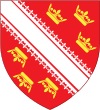
Erstein is a commune in the Bas-Rhin department, in the region of Grand Est, France.

Wimmenau is a commune in the Bas-Rhin department in Grand Est in north-eastern France.
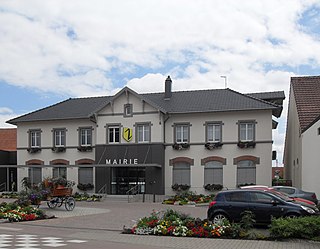
Wolfisheim is a commune in the Bas-Rhin department in Grand Est in north-eastern France. Its synagogue, built in 1897, is a listed monument.

Hipsheim is a commune in the southeast of the Bas-Rhin department in Alsace in north-eastern France.
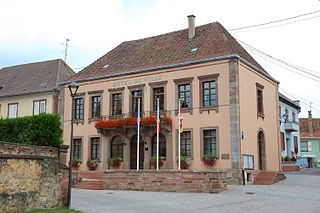
Hochfelden is a commune in the Bas-Rhin department in Grand Est in north-eastern France. On 1 January 2017, the former commune of Schaffhouse-sur-Zorn was merged into Hochfelden.

Wingen-sur-Moder is a commune in the Bas-Rhin department in Grand Est in north-eastern France. The name, literally translated as "Wingen on the Moder", is often shortened to Wingen, although this is the name of a small commune in the Haguenau-Wissembourg arrondissement.

Hagenthal-le-Bas is a commune in the Haut-Rhin department in Alsace in north-eastern France. The Château de la famille d'Eplingen there has been owned by the town since 2003 and been a listed historical monument since 2010.

The history of the Jews in Alsace is one of the oldest in Europe. It was first attested to in 1165 by Benjamin of Tudela, who wrote about a "large number of learned men" in "Astransbourg"; and it is assumed that it dates back to around the year 1000. Although Jewish life in Alsace was often disrupted by outbreaks of pogroms, at least during the Middle Ages, and reined in by harsh restrictions on business and movement, it has had a continuous existence ever since it was first recorded. At its peak, in 1870, the Jewish community of Alsace numbered 35,000 people.

The Château du Petit-Arnsberg is a castle situated in the commune of Obersteinbach in the Bas-Rhin département of Alsace, France. It is dated to the 14th-century.

The Château de Frankenbourg is a ruined 12th century castle in the commune of Neubois in the Bas-Rhin département in Alsace, France.

The Château du Petit-Geroldseck is a ruined castle situated in the commune of Haegen in the département of Bas-Rhin in Alsace, France. It is dated to the 13th century. It has been listed since 1898 as a monument historique by the French Ministry of Culture.
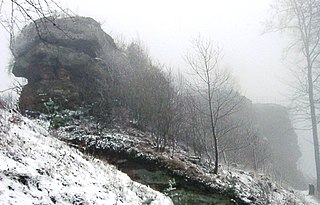
The Château de Lœwenstein is a ruined castle in the commune of Wingen in the Bas-Rhin département in Alsace, France. It is dated to the 12th century and was destroyed in 1387.

Château de Drulingen is a château in Drulingen, Bas-Rhin, Alsace, France. The building was built in 1816 by Jean Schmidt (1775-1844) upon his return from the Napoleonic wars. It became a monument historique on 16 July 1987.

Église Saint-Georges de Châtenois is the Catholic parish church of Châtenois, in the Bas-Rhin department of France. The current church was built from 1759 until 1761 by the local architect Martin Dorgler, but retains a Romanesque steeple from the 12th century, crowned with a spire from 1525. It became a registered Monument historique in 1901.

The Hôtel de Klinglin, currently known as the Hôtel du Préfet, is a historic building located near Place Broglie on the Grande Île in the city center of Strasbourg, in the French department of the Bas-Rhin. It has been classified as a Monument historique since 1970.

The Neubau, also known as Le Neue Bau or Neuer Bau(German for "new building") is a historic building located on the Grande Île in the city center of Strasbourg, in the French department of the Bas-Rhin. It has been classified as a Monument historique since 1995.

Place de la République is one of the main squares of the city of Strasbourg, France. It is surrounded on three sides by five buildings only, of which none is residential: the Palais du Rhin, the National and University Library, the Théâtre national de Strasbourg, the Préfecture of Grand Est and Bas-Rhin, and the tax center Hôtel des impôts. All of these buildings are classified as monuments historiques. The fourth side of the square is devoid of buildings.

The Town hall of Benfeld is a Renaissance city hall in Benfeld, a small town of the Bas-Rhin department of France. It is classified as a Monument historique by the French Ministry of Culture since 1929, in particular because of its 17th-century automaton clock.
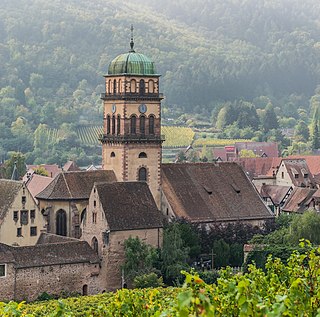
The Église de l′Invention de la Sainte-Croix or, colloquially, Église Sainte-Croix is the mostly medieval parish church of the small town of Kaysersberg, in the Haut-Rhin department of France. The church is situated on the Romanesque Road of Alsace thanks to its ornate sandstone portal from ca. 1230–1235; it is classified as a Monument historique by the French Ministry of Culture since 1932.

Église Saint-Martin is the parish church of the small commune of Marmoutier, in the Bas-Rhin department of France. The church used to belong to Marmoutier Abbey and to be dedicated to Saint Stephen; it is still known as église (church), or abbatialeSaint-Étienne.






















